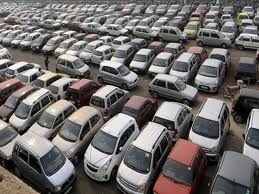Robust demand for diesel passenger cars to further strengthen with no separate tax on diesel vehicles
Budget Highlights X Increase in excise duty from 10 per cent to 12 per cent on small cars (i.e. not more than 4000 mm length with engine capacity not exceeding 1200 cc for petrol cars and 1500 cc for diesel cars).
X Increase in excise duty from 10 per cent to 12 per cent on small cars (i.e. not more than 4000 mm length with engine capacity not exceeding 1200 cc for petrol cars and 1500 cc for diesel cars).
X Increase in excise duty from 22 per cent to 24 per cent on large cars over 4000 mm length with engine capacity not exceeding 1200 cc for petrol cars and 1500 cc for diesel cars.
X Increase in excise duty from 22 per cent + Rs 15000 to 27 per cent on large cars over 4000 mm length with engine capacity exceeding 1500 cc for petrol cars and 1500 cc for diesel cars.
X Excise duty reduced from 10 per cent to 6 per cent on specified parts of hybrid vehicles.
X Increase in customs duty from 60 per cent to 75 per cent on cars as completely built units with FOB value more than USD 40,000 and with engine capacity more than 3000cc for petrol vehicles and more than 2500 cc for diesel vehicles.
X Basic customs, additional customs duty and special additional duty of customs (SAD) on specific parts of hybrid vehicles is being reduced from 10 per cent to Nil, 10 per cent to 6 per cent and 4 per cent to Nil respectively.
X Extended weighted deduction of 200 per cent for R&D expenditure in an in-house facility for a further period of 5 years beyond March 31, 2012.
X Basic customs duty on non-alloy HR and CR coils hiked from 5 per cent to 7.5 per cent. This can lead to more pricing power for steel, and increase in steel cost of the auto sector.
X Increased the exemption limit for general category of individual taxpayers from Rs 1.80 lakh per annum to Rs 2 lakh per annum. Revised the tax limits for general category of individual tax payers: at nil for upto Rs 2 lakh per annum, 10 per cent for over 2 lakh to upto 5 lakh per annum; 20 per cent for over 5 lakh to upto 10 lakh per annum and 30 per cent for over Rs 10 lakh per annum.
X Allowed deduction of upto Rs 10,000 for interest from savings bank account.
X Proposal to provide weighted deduction at 150 per cent of expenditure incurred on skill development in manufacturing sector.
X No change in the corporate income tax rates.
Industry expectations not met
X Retain the excise duty of small cars at 10 per cent.
X Reduce the excise duty from 22 per cent to 10 per cent on big cars i.e. cars which are longer than 4 metres and have engine capacity over 1200 cc in case of petrol and 1500 cc in case of diesel.
X Withdraw additional tax of Rs 15000 on big cars with engine capacity exceeding 1500cc.
X Clarity on auto fuel policy
X Implementation of direct tax, GST, policies long overdue
Budget Impact
The across the board hike in excise duty for passenger vehicles is negative however the level of impact on demand varies among different types of passenger vehicles. In the case of passenger cars, the largest segment in passenger vehicles, the budget has worsened the demand for petrol passenger cars, which is already reeling under the pressure of high interest rates.
However, with nil action on diesel prices/separate tax on diesel vehicles, the already skewed demand towards diesel passenger cars has been strengthened. Auto companies have been holding up investment of over Rs 3000 crore due to lack of clarity on diesel policy so far.
The diesel fuel prices are regulated while petrol prices have been de-regulated since June 2010 and has witnessed hike by Rs 14.21 per litre since June 2010. This has led to skewed demand towards diesel cars despite its higher around Rs 80,000- Rs 1, 00,000 tag over petrol car.
On the other hand, in comparison to passenger cars, the hike in excise duty on utility vehicles is moderate due to consumer class it caters to.
With the government raising the tax limits as well as exemption limits for interest rates on saving account would aid in increasing the cash in hands of people. This would indirectly aid in the demand for passenger vehicles once the interest rates begin to show signs of decline.
Outlook
The FY 2012 so far has been tough one for the passenger vehicles especially passenger car industry on account of high interest rates, inflation and growing skewed demand for diesel vehicles. The hike in excise duty has only added on to their woes. However, with nil action on diesel vehicles, the demand for passenger vehicles will be strongly skewed.











 © 2025
© 2025